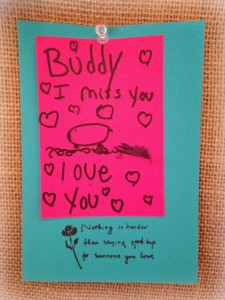For kids of all ages, losing a pet can be a confusing, heartbreaking and scary experience. For many kids, it might even be the first time they have had to grapple with death and grief. But, along with all of the pain, sadness, and unknowns, pet loss is something else for kids and parents, too: an opportunity.

As a parent, you know that you can’t always shield your children from the pain that exists in the world, nor should you want to. Heartache teaches us difficult and important lessons about life, love, gratitude and resilience. How we grieve as adults grows from our early experiences with loss, and family reactions and values surrounding death stay with us. When your family loses a beloved companion animal, it is so important to model healthy, effective communication and coping skills for the children in your life. This is no small feat because it requires you to face your own loss and coping strategies head on. It is especially difficult to help guide your child through grief while you yourself are dealing with the loss in your own way. Here’s where you can start:
Keep communication open. Grieve openly, and encourage your children to ask questions and then answer them honestly. Ask them, “What do you wonder about?” If they ask you an unanswerable question, it’s okay to say “I don’t know. I wonder about that, too”. An important part of grieving is coming to terms with unanswerable questions, and it is okay to come to terms with them together.
It’s okay to cry. No matter your age or gender, it is always okay to cry. Crying is an important part of mourning, and it can give you some emotional relief. And, sometimes you just can’t help it. Allowing your children to see you cry shows them that it’s okay to be sad and it’s okay if you can’t always be strong. In fact, sometimes crying can be a brave thing to do.
Respect their unique process. Every child is different in their mourning, and every child’s relationship with their pet is unique. Remind yourself that they are feeling just the way they need to, and meet them where they are. Some kids are inconsolable for days or weeks after their loss, and other kids are back to happily playing with their toys within a few hours. Both reactions can be difficult for parents to see, but it’s important to remember that there are many shades of normal.
Remember together. Ask your kids about their memories and encourage them to express them creatively. Maybe they want to make a scrapbook of their pet, or write them a letter, or plant them a tree. There are many ways to memorialize a pet, and sharing them together shows children that their pet will never be forgotten and encourages them to continue their bond with them. Children especially need outlets for non-verbal expressions of their grief. Creative activities, projects and outings are essential.
Give them the words. If you feel happy, angry, sad, tired, or any other emotion, tell them. Grieving makes us feel a lot of different feelings, and learning the right vocabulary to talk about those feelings is crucial for kids. There is more than just happy and sad, and you can even feel many ways at once. Very young children might benefit from using an emotion chart so they can point to pictures of faces, which you can find here.
Ask for help. If you are having difficulty coping with your grief, reach out for support. Not only is it important to take care of yourself in order to care for your family, but it is important to show your children that it’s okay if you feel like you want some help sometimes. If you just need a break, find a loved one to help with your kids and household. If you feel stuck with supporting your kids in their grief, try to utilize the help that exists, such as a support group, the counselor or social worker at your child’s school, or online education for ideas.
Take care of yourself. Grieving is such hard work, and simultaneously taking care of other people while you are grieving can feel next to impossible. When you are a parent, it is even more important to practice self-care so that you can effectively support your kids, too. Be kind to yourself and give yourself a break. No one is perfect and it’s okay if you stumble along the way. The fact that you care and are trying is what matters for your kids.

Healthy coping strategies aren’t innate, they are learned from those around us. Children are much more perceptive than we give them credit for, and when they have lost their pet, they look to the adults in their lives for cues on how to face the loss. Try to use this opportunity to model healthy coping skills rather than avoidance, and encourage them to feel, talk, express, and remember.
